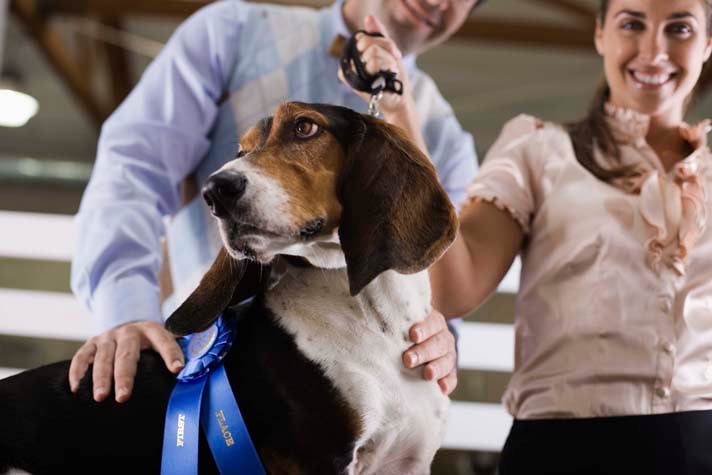

Co-owning a purebred show dog can be a mutually beneficial and enjoyable relationship. It is also possibly one of the more complicated, precarious relationships you can have. Consider these seven key ways to ensure that your purebred dog co-ownership will be rewarding and not turn into a nightmare, as so many do.
The perfect contract does not exist, but show dog co-owners should strive to draft each individual agreement to include all the important terms in clear, explicit language, describing the entire agreement of the parties. “One size fits all” just does not work for show dog co-ownership contracts. Drafting an individualized contract is well worth the time it takes.
Co-ownerships, like all contracts, boil down to the parties exchanging something of value, such as a purebred show dog, for something else of value, such as money. Many things of value can be exchanged for a show dog: future stud fees, puppies back, advancement of one’s kennel name affixed to a top-winning show dog and so forth. Likewise, the purchaser can get not just a great show dog, but also invaluable affiliation with a well-known dog breeder that helps gain introductions and open doors otherwise not available to him or her.
If what you want is not specified in the written agreement, then you have no assured contractual right to it. It might be possible to prove in court that additional terms exist outside the written agreement, but this can be a difficult and expensive process — and not guaranteed to succeed.
Most dog sellers can write a contract that identifies the “basics,” such as price, or number of puppies back. More abstract terms often exist, which parties often omit (accidentally or purposefully) from the written agreement. These might include such issues as whether the seller is expected to serve as the dog handler; and if so, will he be paid (by the co-owner) for this? Will the show dog be advertised heavily? Will co-owners split expenses evenly? Is there a cap to such expenses? When does the co-ownership of the show dog end?
Each party involved should let the other side know exactly what they expect each side to do, and not do. A show dog buyer’s list of wants might include “breeder teaches me grooming and handling” or “we split fees if this dog shows like the Westminster Kennel Club Dog Show” or “I can buy you out at any time.” A specials co-owner might expect free breeding rights or half of all income generated by the show dog. Better to find out these things up front and customize the deal (perhaps enhancing the price in exchange for certain items) to provide for a complete listing of, and equitable compensation for, what each side is giving and getting.
Likewise, each party should identify their “worst nightmares” and include contractual language to avoid such occurrences. For example, does the buyer expect that permanent possession of the show dog will always be with him or her, even if the seller borrows the dog for a month to attend conformation dog shows? What if the seller borrows the dog for shows, then decides he likes it so much he is going to keep the show dog indefinitely. If the contract is silent about permanent possession, and this scenario occurs then a lawsuit is brewing, where both sides try to prove their version of what their understanding was about permanent possession. These battles can be lengthy and expensive. Instead, communicate with your co-owner about what contract terms you need, and what he might need, to avoid these sorts of “worst case scenarios.”
It is helpful for a contract to include an effective “remedies” clause, to identify what happens if either side breaches the contract. This might include assurance that the breaching party will (a) return/give up possession of the show dog, (b) sign off the AKC registration, and/or (c) pay the other side’s attorneys’ fees plus [name your sum] dollars in “liquidated damages.”
A strong damages clause helps identify what you will get in damages if the other side breaches the agreement. It also outlines the maximum for which you can be held responsible if you are found to have breached the agreement.
Have a frank, open discussion with your prospective co-owner about expectations and concerns before an agreement is made, and draft an agreement tailored to the particular situation with your co-owner. Then, bring your draft to an attorney experienced in show dog contracts, for a last review. This will help you gain assurance that your written co-ownership agreement will achieve your expectations, while protecting you from possible pitfalls.
Show dog co-ownerships can work out well for all parties involved; just make sure each person understands the terms when entering the agreement and that each party will be protected in the future. Co-ownerships, in addition to their potential pitfalls, have many worthwhile benefits.
Lisa Curry practices law in New Jersey and raises and shows West Highland White Terriers and Toy Fox Terriers. www.lawfordogs.com
Posted by: Chewy Editorial